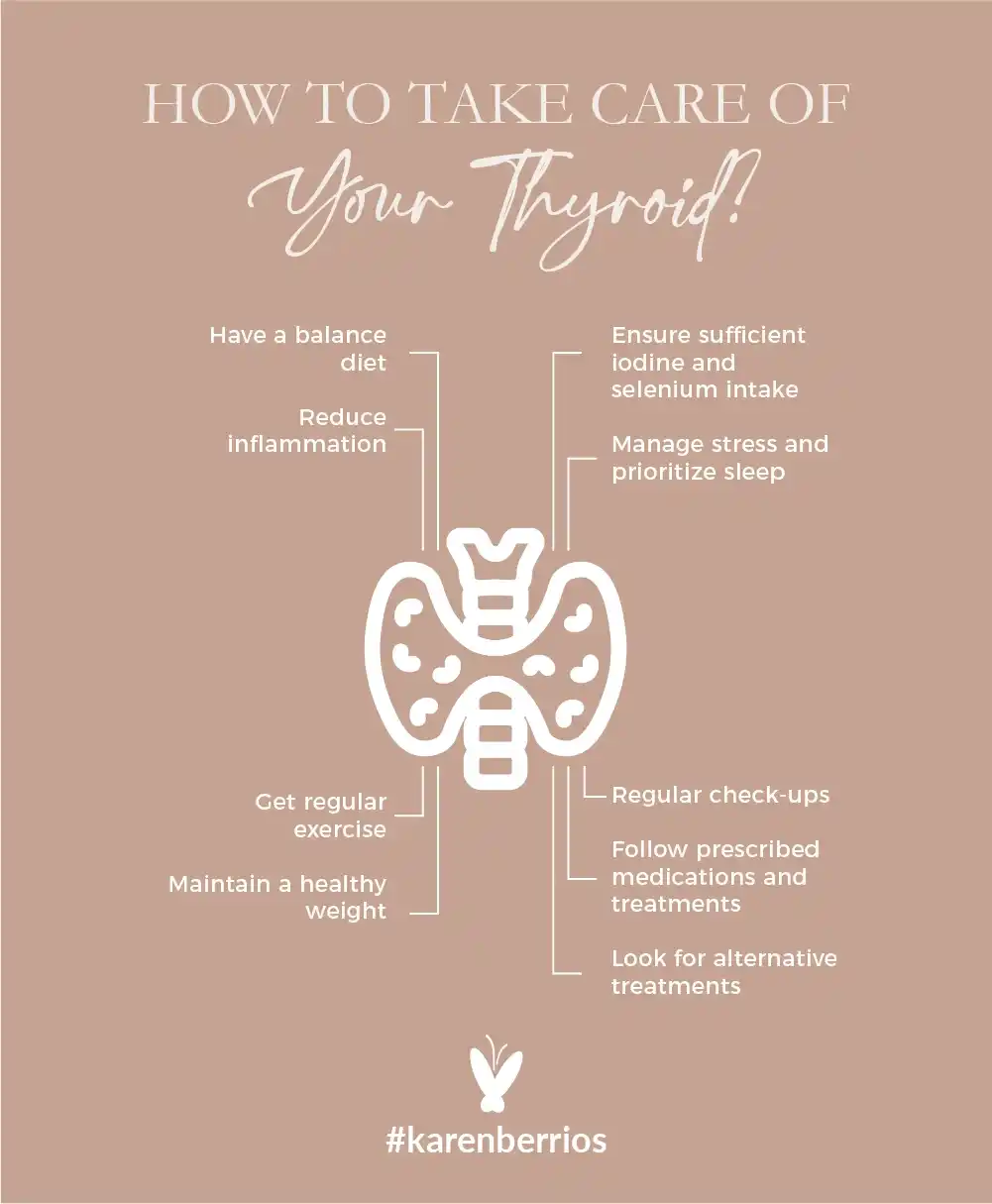

How to Take Care of Your Thyroid?
Care of Your Thyroid. The thyroid is one of the most important glands in the human body and yet, we rarely ever think about how to optimize its health and function. When it’s not working properly, it brings on a variety of health conditions, potentially bringing dysfunction into other areas. That’s why it’s so important to find the best practices and routines to take care of your thyroid before it gets out of hand.
Looking For Signs of Thyroid Dysfunction
When the thyroid is not underactive or overactive, it causes a variety of symptoms that can seem pretty vague from the outside. Fatigue, weight gain or weight loss, dry skin, brittle nails, anxiety, sleep disorders…these can all be caused by a plethora of diseases and health conditions. Rarely do we start experiencing something and think to check our thyroid gland.
Still, it’s important to pay attention to the signs your body is telling you and notice when you’re feeling like something is off or not adding up. Extreme fatigue when you’ve just come back from a relaxing vacation, unexplained weight loss or weight gain, constant mood changes, insomnia, or sudden digestive issues not caused by a change of diet.
Thyroid dysfunction refers to any condition that affects the normal functioning of the thyroid gland, which plays a crucial role in regulating various bodily functions, including metabolism, growth, and development. Here are some early signs and symptoms that may indicate thyroid dysfunction to pay attention to:
- Fatigue and weakness: Feeling excessively tired or lacking energy, even with adequate rest, can be a symptom of an underactive thyroid (hypothyroidism).
- Weight changes: Unexplained weight gain or difficulty losing weight, especially with no significant changes in diet or exercise, can be associated with both hypothyroidism and, less commonly, overactive thyroid (hyperthyroidism).
- Changes in heart rate: A slow heart rate (bradycardia) is commonly seen in hypothyroidism, while an elevated heart rate (tachycardia) can be a symptom of hyperthyroidism.
- Sensitivity to cold or heat: Feeling unusually sensitive to cold temperatures or having an intolerance to heat can be signs of both, hypothyroidism and hyperthyroidism.
- Mood changes: Thyroid dysfunction can affect mood and mental well-being. Depression, anxiety, irritability, and mood swings are common symptoms seen in both hypothyroidism and hyperthyroidism.
- Changes in bowel habits: Constipation is frequently associated with hypothyroidism, while an increased frequency of bowel movements or diarrhea may be observed in hyperthyroidism.
- Changes in the menstrual cycle: Women with thyroid dysfunction may experience irregular menstrual cycles, heavier or lighter periods, or even fertility issues.
- Hair and skin changes: Dry, brittle hair, hair loss (especially from the outer third of the eyebrows), dry skin, and brittle nails can be symptoms of hypothyroidism.
- Muscle aches and weakness: Unusual muscle aches, cramps, stiffness, and generalized weakness are common symptoms seen in hypothyroidism.
- Swelling and puffiness: Thyroid dysfunction can cause swelling and puffiness in the face, hands, feet, or other areas of the body due to fluid retention.
It’s important to note that these signs and symptoms can be attributed to various other health conditions as well. If you suspect you may have thyroid dysfunction, it’s recommended to consult with a healthcare professional, such as your primary care physician or an endocrinologist. They can evaluate your symptoms, conduct necessary tests (such as blood tests to measure thyroid hormones), and provide an accurate diagnosis and appropriate treatment if needed.
When to Check Your Thyroid?
Checking your thyroid function may be necessary if you experience the abovementioned signs and symptoms, or have certain risk factors that could indicate a thyroid disease. Here’s when you should check your thyroid:
- If you experience symptoms such as unexplained fatigue, weight changes, mood swings, hair loss, changes in bowel habits, or menstrual irregularities.
- If you have a family history of thyroid disorders, such as hypothyroidism or hyperthyroidism.
- If you have a history of autoimmune conditions, such as Hashimoto’s thyroiditis or Graves’ disease, since these are common causes of thyroid dysfunction.
- If you’re planning to conceive or are already pregnant, your healthcare provider may recommend thyroid screening to ensure optimal thyroid function during this critical period.
- If you’re prescribed certain medications, such as lithium or amiodarone that can affect thyroid function.
- If you have a history of thyroid conditions or have undergone thyroid surgery.
Additionally, in some cases, thyroid screening may be a part of routine preventive healthcare, particularly for individuals at higher risk of thyroid dysfunction based on age, gender, family history, or other factors.
Tips to Take Care of Your Thyroid
Taking good care of your thyroid gland involves adopting healthy lifestyle habits and being mindful of certain factors that can affect thyroid function. Here are some tips to help maintain thyroid health:
- Eat a wholesome, balanced diet: Include a variety of thyroid-healing, nutrient-rich foods in your diet, such as fruits, vegetables, whole grains, lean proteins, healthy fats, and a variety of superfoods. Avoid excessive consumption of processed foods, refined sugars, and unhealthy fats, as they can contribute to inflammation and metabolic imbalances.
- Reduce inflammation: Sometimes cleaning up your diet isn’t enough to lower your inflammation to the point where it cannot cause you harm. Use superfoods, healing herbs, and other plant compounds to support your entire system from the inside out.
- Abstain from certain lifestyle habits: Limit your alcohol intake and avoid smoking as they’re both detrimental to thyroid health.
- Ensure sufficient iodine intake: Iodine is essential for proper thyroid function, as it is required for the production of thyroid hormones. Iodine deficiency can cause a variety of issues within your thyroid, impairing its function. Include iodine-rich foods in your diet, such as seaweed, seafood, or iodized salt. However, be cautious with iodine supplementation, as excessive intake can also have negative effects on thyroid health.
- Get enough selenium: Selenium is a trace mineral that plays a crucial role in thyroid hormone metabolism. Consume selenium-rich foods like Brazil nuts, seafood, organ meats, and whole grains. However, avoid excessive selenium intake, as high levels can be harmful.
- Manage stress: Chronic stress can impact thyroid function. Practice stress management techniques such as regular exercise, meditation, deep breathing exercises, and engaging in activities that help you relax and unwind.
- Get regular exercise: Engage in regular physical activity to support overall metabolic health and promote proper hormone regulation. Aim for a combination of cardiovascular exercise, strength training, and flexibility exercises.
- Prioritize sleep: Aim for sufficient, quality sleep each night. Poor sleep can contribute to hormonal imbalances and affect thyroid function. Create a sleep-friendly environment, establish a regular sleep routine, and practice good sleep hygiene habits.
- Limit exposure to toxins: Toxins, such as heavy metals and environmental pollutants, can disrupt thyroid function. Minimize exposure to harmful substances by using natural personal care products, opting for organic foods, and avoiding exposure to environmental toxins whenever possible.
- Maintain a healthy weight: Both obesity and severe calorie restriction can negatively impact thyroid function. Strive for a healthy weight range through a balanced diet and regular physical activity.
- Regular check-ups: Visit your healthcare provider regularly for check-ups and screenings. Routine monitoring of thyroid function can help detect any abnormalities early on.
- Follow prescribed medications and treatments: If you have a diagnosed thyroid condition, adhere to your prescribed medications and treatment plan. Take medications as directed by your healthcare provider and attend follow-up appointments to ensure optimal management of your thyroid health.
- Look for alternative treatments: Listen to your body. If a prescribed treatment isn’t working for you, talk to your doctor about switching things up and finding alternative solutions.
Final Thoughts
Taking care of your thyroid should be pretty high on your list of health priorities. Look for early signs and symptoms, take action, and implement good lifestyle habits that can support the health of your thyroid and prevent thyroid disease.

hey there
I'm Karen!
I have found my cancer journey to be a positive and profound transformational experience. I’m inspired to share my healing journey here, and trust you’ll find hope, encouragement and purpose as you discover the healing power that lies within you.
Join
The Mailing List!
By signing up for my newsletter, you agree with our Privacy Policy and Terms & Conditions.



